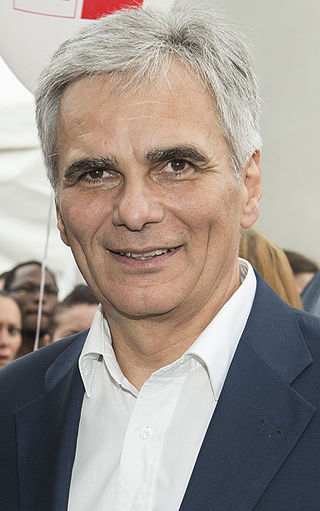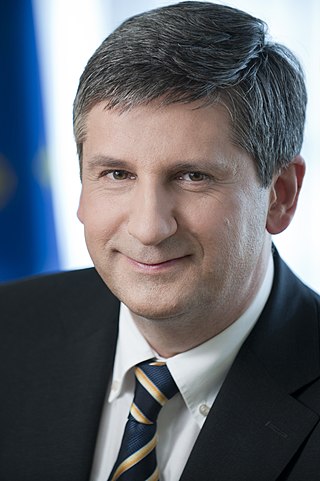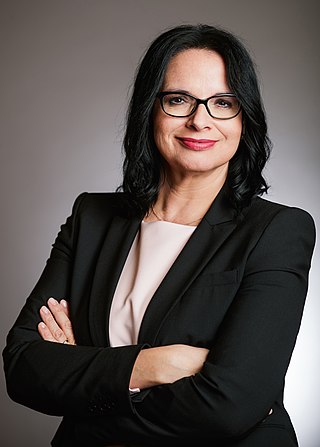
The chancellor of Austria, officially the federal chancellor the Republic of Austria, is the head of government of the Republic of Austria.

Politics in Austria reflects the dynamics of competition among multiple political parties, which led to the formation of a Conservative-Green coalition government for the first time in January 2020, following the snap elections of 29 September 2019, and the election of a former Green Party leader to the presidency in 2016.

Ursula Plassnik is an Austrian diplomat and politician. She was Foreign Minister of Austria between October 2004 and December 2008. She has served as the Austrian ambassador to Switzerland from 2016 to 2021.

Islam in Austria is the largest minority religion in the country, practiced by 7.9% of the total population in 2016 according to the Austrian Academy of Sciences. The majority of Muslims in Austria belong to the Sunni denomination. Most Muslims came to Austria during the 1960s as migrant workers from Turkey and Yugoslavia. There are communities of Arab and Afghan origin as well.

Christoph Matznetter is an Austrian politician. He has been a member of the Austrian Parliament since 2002. His service in parliament was interrupted by a brief tenure from 2007 to 2008 as State Secretary in the Federal Ministry of Finance. He is a member of the Social Democratic Party.

Werner Faymann is an Austrian former politician who was Chancellor of Austria and chairman of the Social Democratic Party of Austria (SPÖ) from 2008 to 2016. On 9 May 2016, he resigned from both positions amid widening criticism within his party.

Michael Spindelegger is an Austrian politician. He served in the cabinet of Chancellor Werner Faymann as foreign minister of Austria from 2008 to 2013 and as finance minister from 2013 to 2014; additionally, he held the office of vice-chancellor from 2011 to 2014. Spindelegger was also the leader of the Austrian People's Party (ÖVP) from 2011 to 2014. In August 2014 he unexpectedly resigned from all political positions. Since 2016, he has been serving as Director General of the Vienna-based International Centre for Migration Policy Development (ICMPD).

The chancellor of Germany, officially the federal chancellor of the Federal Republic of Germany, is the head of the federal government of Germany, and the commander-in-chief of the German Armed Forces during wartime. The chancellor is the chief executive of the Federal Cabinet and heads the executive branch. The chancellor is elected by the Bundestag on the proposal of the federal president and without debate.

Dorothee Gisela Renate Maria Bär is a German politician of the Christian Social Union of Bavaria (CSU) who has been serving as a member of the German Bundestag since 2002. From 2014 to 2021, she served in various capacities in the government of Chancellor Angela Merkel.

Johannes Hahn is an Austrian politician who has served as European Commissioner for Budget and Administration under Ursula von der Leyen since 1 December 2019.

The Federal Chancellery of Austria is the ministry led by the chancellor of Austria. Since the establishment of the First Austrian Republic in 1918, the Chancellery building has served as the venue for the sessions of the Austrian cabinet. It is located on the Ballhausplatz in the centre of Vienna, vis-à-vis the Hofburg Imperial Palace. Like Downing Street, Quai d'Orsay or – formerly – Wilhelmstrasse, the address has become a synecdoche for governmental power.

Gabriele Heinisch-Hosek is an Austrian politician. She served as minister without portfolio between 2 December 2008 and 16 December 2013. In addition, she was the federal minister for women and civil service within the Federal Chancellery between 18 December 2008 and 18 May 2016.

Reinhold Mitterlehner is an Austrian politician of the Austrian People's Party (ÖVP) who served as minister of economy in Austria's government from 2008 until 2017. In September 2014 he also became vice chancellor of Austria and chairman of the ÖVP. On 9 May 2016 he briefly assumed powers and duties as Acting Chancellor of Austria while his coalition partner, the Social Democratic Party, underwent a change in leadership. After a series of quarrels within the grand coalition as well as his own party, Mitterlehner announced his resignation on 10 May 2017, which became effective on 17 May 2017.

The Second Faymann government was a government of Austrian Chancellor Werner Faymann. It took office on 16 December 2013 following the 2013 legislative election, succeeding the First Faymann government. On 17 May 2016, it was succeeded by the Kern government, following Faymann's resignation amidst the 2016 presidential election.

Christian Kern is an Austrian businessman and former politician who served as Chancellor of Austria from 17 May 2016 to 18 December 2017 and chairman of the Social Democratic Party from 25 June 2016 to 25 September 2018.

Andreas Schieder is an Austrian politician who has been a Member of the European Parliament since 2019.

Michael Ludwig is an Austrian politician of the Social Democratic Party (SPÖ). Since May 2018, he has been Mayor and Governor of Vienna, the capital and largest city of Austria. Since January 2018, he has also served as chairman of SPÖ Vienna. Prior, he was City Councillor for Housing, Construction, and Urban Renewal from January 2007 until his election as mayor. He was also Second Deputy Mayor and Governor of Vienna from March 2009 to October 2010.

Claudia Schmied is an Austrian politician, a member of the Social Democratic Party of Austria.

Andrea Mayer, during her marriage Andrea Ecker, is an Austrian politician and current cabinet director of the Presidential Chancellery. From 2020 until 2024, she served as state secretary in the Federal Ministry for Arts, Culture, the Civil Service and Sport in the Second Kurz, Schallenberg, and Nehammer governments, nominated by the Greens.


















